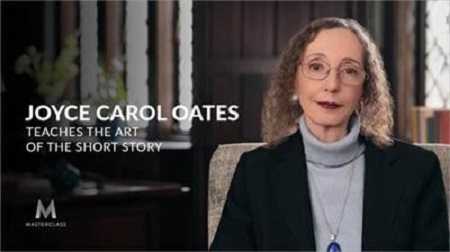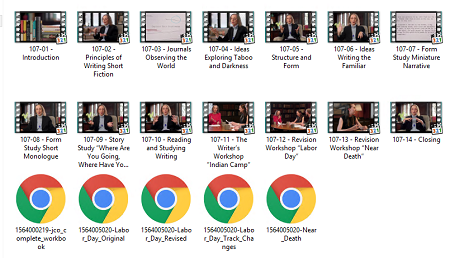
Joyce Carol Oates Teaches the Art of the Short Story (up)
Original Price: $N/A
Yours FREE DOWNLOAD!!!
Author: Joyce Carol Oates
Sale Page :_https://www.masterclass.com/classes/joyce-carol-oates-teaches-the-art-of-the-short-story
Joyce Carol Oates has been recognized as a literary treasure for more than 50 years. Her work has been honored with many distinguished awards, including the National Book Award for her novel “them.” She’s also won two O. Henry Awards, the National Humanities Medal, and the Jerusalem Prize.
Prolific and adept at moving across genres, Joyce has written 58 novels so far and thousands of short stories, articles, and essays. Several of her novels, including “Black Water,” “What I Lived For,” and “Blonde,” as well as two of her short story collections, have been Pulitzer Prize finalists. She has taught at Princeton University since 1978, and now the esteemed creative writing professor teaches you the art of the short story.
In Joyce’s MasterClass, learn how to write a short story that connects with readers. Joyce teaches you the principles of engaging short fiction-from sentences to structure-and tools for self-exploration and improved self-expression. Discover your instincts as a storyteller, develop your voice and your own personal narrative, and learn how to find ideas all around you and inside you. Approach writing as an adventure, experiment with form and structure and find your best idea yet.
In this online writing class, you’ll learn about:
The principles of writing short stories
Where to find short story ideas
Connecting with readers through the taboo
Journaling and self-expression
Mining your experiences for story ideas
Analyzing and constructing monologues
Gaining inspiration and ideas by reading with intention
Experimenting with different forms of writing
Learning from examples of American short fiction
Creative writing through self-exploration
01. Introduction
Meet your new instructor: Joyce Carol Oates, the National Book Award-winning author of 58 novels and thousands of short stories. Joyce welcomes you and discusses the enduring importance of short fiction.
02. Principles of Writing Short Fiction
You want to write. When and how do you get it done? Joyce explains how to draft, revise, and share your work with others. She also touches on rejection and how to protect your time for writing.
03. Journals: Observing the World
Journaling is a tried-and-true method for self-expression and discovering your voice. For illustration, Joyce reads from one of Virginia Woolf’s diary entries.
04. Ideas: Exploring Taboo and Darkness
Joyce discusses how delving into the darker elements of your personality and past can provide compelling, heartfelt fodder for fiction-as well as a means to finding a unique audience.
05. Structure and Form
Some of Joyce’s experimental approaches to structure include considering the shape of a story on its first page and writing a one-sided dialogue. She reads from her story “Heat.”
06. Ideas: Writing the Familiar
Your past and your family can be a rich trove of story material. Joyce walks you through examining childhood influences, interviewing family, and remembering physical places that have left a lasting impression on you.
07. Form Study: Miniature Narrative
Joyce analyzes very brief narratives-ones with no more than a few pages-for the language and structure they require. As an example, she reads from the William Carlos Williams story “The Use of Force.”
08. Form Study: Short Monologue
Writing a monologue can be a useful stepping-stone to crafting a novel, as well as a good exercise in exploring the perspectives of characters unlike yourself. Joyce’s monologue story “Lethal” serves as an illustration.
09. Story Study: “Where Are You Going, Where Have You Been?”
Joyce reveals what inspired-and how she wrote-her most well-known and reprinted story, including how she chose the main character’s perspective and how adjusting perspective can be helpful for your own story.
10. Reading and Studying Writing
How do you read with the intention of finding new ideas and learning from writers you admire? Joyce leads a discussion on reading as a writer.
11. The Writer’s Workshop: “Indian Camp”
Joyce and two of her students-Lindsey Skillen and Corey Arnold-read from Ernest Hemingway’s story “Indian Camp.” They review the work as they would in one of Joyce’s collegiate or graduate classes.
12. Revision Workshop: “Labor Day”
Joyce holds a workshop of her student Lindsey’s story “Labor Day,” which can be downloaded in advance of the lesson.
13. Revision Workshop: “Near Death”
This workshop focuses on Corey’s short story “Near Death,” which can also be downloaded in advance.
14. Closing
Joyce shares her parting words, advising how to select a place to write that makes you feel inspired and how to continue finding joy in the writing process.


Joyce Carol Oates Teaches the Art of the Short Story (up): Video, PDF´s
Download from rapidgator.net
MasterClass.Joyce.Carol.Oates.Teaches.the.Art.of.the.Short.Story.02.19.rar
Download from Nitroflare
MasterClass.Joyce.Carol.Oates.Teaches.the.Art.of.the.Short.Story.02.19.rar
==> Download From Mega.: (FREE DOWNLOAD)
 ***If link dead, please leave a message,or to send message to a ebusinesstores@gmail.com We will update immediately***
***If link dead, please leave a message,or to send message to a ebusinesstores@gmail.com We will update immediately***


Mega link please
Done!
No .srt or .vtt subtitles, dang.
Sir mega links are down.. Any chance you can provide new mega little links? Thanks in advance
Sir any chance for a re up.. Mega links are down
Sir can you please share the mega link… Megadownloader links are locked. Pls help
Sir please provide mega links as requested…
Sir pls pls pls help with the mega link